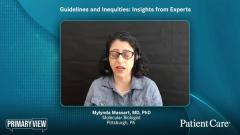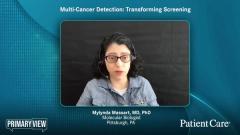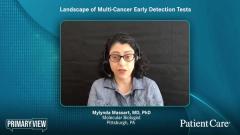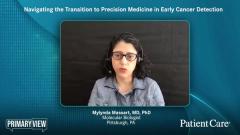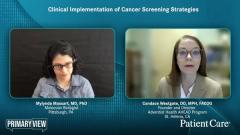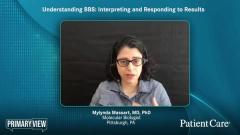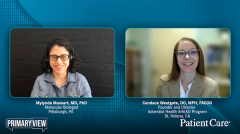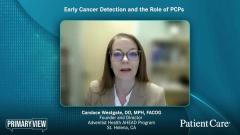
Guidelines and Inequities: Insights from Experts
Candace Westgate, DO, MPH, FACOG, and Mylynda Massart, MD, PhD, introduce this series on early cancer detection, multi-cancer detection tests, and the role of primary care physicians (PCPs) in preventative care.
Episodes in this series

Transcript
Candace Westgate, DO, MPH, FACOG: Let’s start at the beginning and talk a little bit more about the current burden of cancer within the United States and how it’s expected to change in the future. Mylynda, what do we know currently about where we stand right now?
Mylynda Massart, MD, PhD: Yes. So really a lot of challenges right now have to do with cancer still [being] the second leading cause of death in our country. And it just has a huge impact. I don’t actually know a single person who has not somehow been touched by cancer in one shape or another personally, with cancer diagnoses in my family, most recently my sister with breast cancer during the pandemic. And she’s doing great, thank you so much. And professionally with my patients. And I take care of a lot of high-risk patients, both by family and genetic history for hereditary cancer syndromes. But I also take care of a lot of high-risk patients by ancestry and social and structural determinants of health. And a lot of patients who are underserved historically and often don’t achieve a cancer diagnosis until very late stage. And it’s just disheartening.
Candace Westgate, DO, MPH, FACOG:Absolutely. So tell us a little bit more about where we stand regarding guidelines. So we know that there are currently 5 cancers that have societal guidelines helping us to know when to start screening patients. Let’s talk a little bit about the limitations associated with that and where we see inequities within our country.
Mylynda Massart, MD, PhD:I mean with the 5 screenings, right. So we have 4 that are A and B United States Preventive Services Task Force screening guidelines for breast cancer, cervical cancer, for colorectal cancer, and for lung cancer. And then kind of that lower grade C for prostate cancer. And I think that the challenges are very multilevel. The first challenge is in the definition itself. We are only screening for 5 cancers, and there are so many more cancers that are out there and some that are really top of mind, I think of ovarian cancer, pancreatic cancer, as well as some of the rarer cancers. So that’s one challenge in itself—we are really limited in how many cancers we’re screening for. The second layer is that those screenings that we do have are complex. They are difficult to access. There are many barriers for the patients to be able to achieve those cancer screenings with time off from work, time away from family, the prep that it requires, the geographic [location]. Sometimes access to these types of screenings can take up to a full day off work for that colonoscopy or more. And all of these are quite invasive, right? They’re uncomfortable. No one enjoys this. This is something that’s important but really not very pleasant in our health care. And so that’s also a significant barrier. And then all of those are worsened, of course, by any intersecting identities in terms of ancestry, minority status, in terms of lower socioeconomic status, in terms of lower education levels, and, of course, access to insurance. So really, this is a multilevel challenge that we’re facing in…our current screening guidelines.
Transcript was AI-generated and edited for clarity.
Newsletter
Enhance your clinical practice with the Patient Care newsletter, offering the latest evidence-based guidelines, diagnostic insights, and treatment strategies for primary care physicians.

